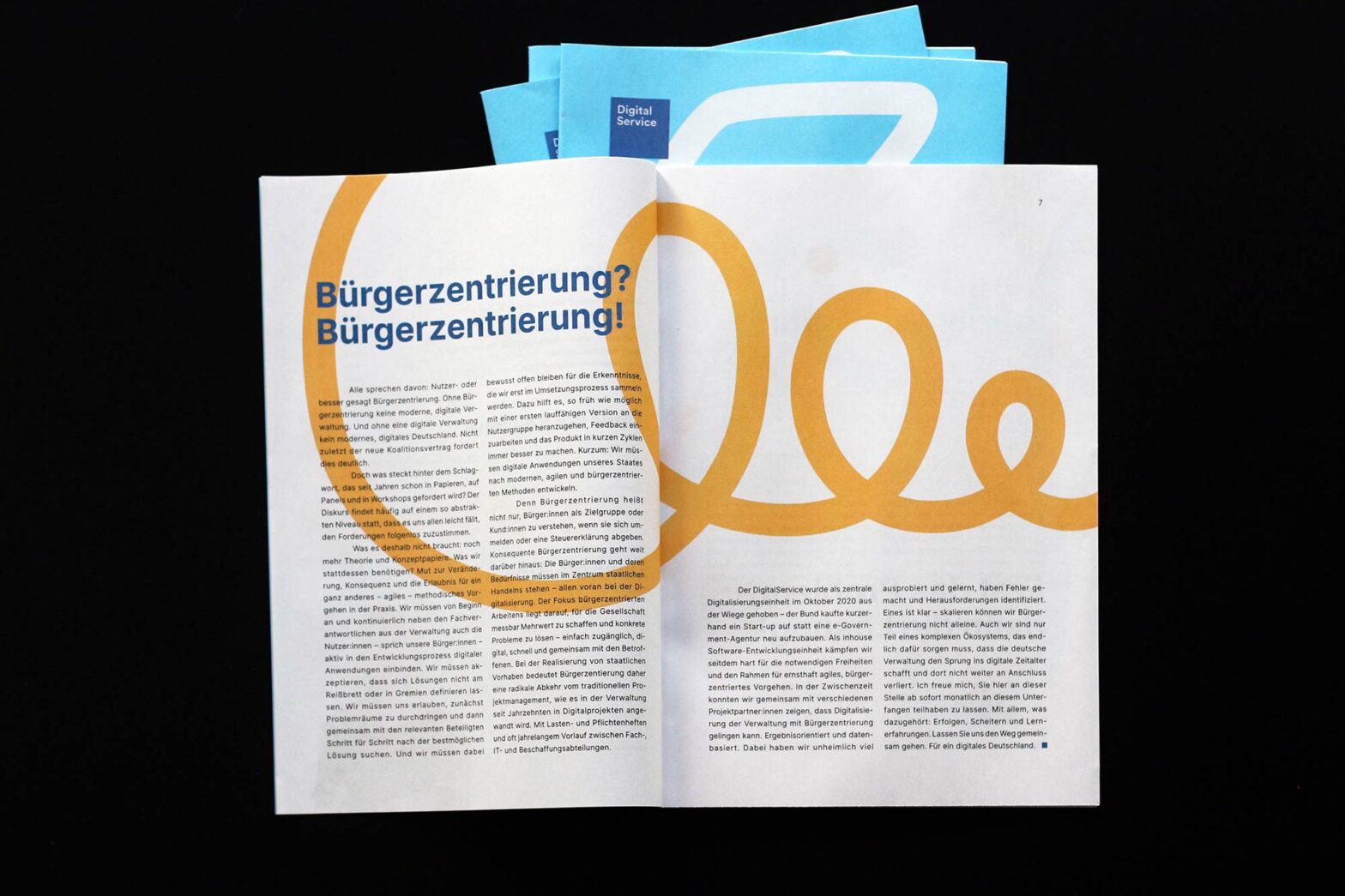Something tangible! This week, printed copies of a little booklet arrived. It collects the monthly op-ed columns our CEO Christina has been writing for the German civil service newspaper ‘Behörden Spiegel’.
Daphne turned the first 6 texts into a 24-page booklet for a more focused reading experience. Each text has an evocative illustration linked to its topic. It has the size of a US comic book and uses lighter newspaper-style paper. The booklet should have just the proper appearance for people to pick it up and keep it around their office – instead of binning it like a newspaper. I expect Christina’s columns to reach a greater audience this way, and we will take it to events we’re attending.
The first event to give out some copies was a ‘Careers in GovTech’ networking night at Hertie School’s Centre for Digital Governance. Their student society had invited people from half a dozen ‘GovTech’ organisations. It turned out to be a fast 90-minute networking event with 30 mins of short presentations. So I had less than 5 minutes to give an introduction to Digital Service.
After everyone had given an intro to their organisation, mission, work and roles, rapid Q&A rounds followed. The 60-ish students were almost exclusively international and non-German speaking. Some had previously worked in government roles in their home countries like Brazil and India and wanted to know how their skills and experiences might transfer to our positions.
That experience offered another angle to the local meetup format we are currently exploring. So far, our assumption was we could run a meetup in German. But given our different goals, a more open and mixed approach would be beneficial. For me, the main reasons for organising an event ourselves are these:
- Offering an alternative platform to showcase public sector work – next to all private sector meetups – and start a deeper exchange with the public
- Increasing public accountability and opening up further
- Attracting potential talent by showing them what we do and how we work
Especially for the latter, we need to communicate in English. But the same goes for the first two points, too. Most meetups in Berlin are in English, and running one in German in such an international scene is exclusionary.
Enough other semi-closed formats in German exist that are made for public sector organisations and public servants. NExT’s community events are among the most important ones. And so I was utterly delighted to hear that Ann Cathrin Riedel the managing director role for the public sector network. Having met her last summer when she visited us with a Taiwanese delegation, I cannot wait to talk about communities of practice with her and explore where synergies are.
Sharpening what designers do
On Tuesday, I shared the often-mentioned design skill level matrix in our ‘Design Weekly’ format. On that day, I considered it to be version 0.9. And shortly after found errors and typos. So, we are getting closer to the first proper version. Charlotte, Tom and I read through a good chunk of the descriptions, and we saw the growing cognitive overload for the designers who tried to follow.
In the coming days, we want to figure out how the design skill definitions can be helpful to the designers. The sharing was only the overdue starting point of a dialogue about roles and tasks, growth paths, and objective setting. Next week, we want to collect questions and have a more extended conversation about the details of the matrix. Then, we can better understand what additional formats the design skill level matrix needs to become actionable. I want us to open it up and share it publicly as soon as possible. It could be an empowering tool for applicants and let them see where they are in our organisation’s understanding of seniority. For us, it might shorten discussions with some applicants when talking about seniority levels and expectations.
That topic triggered a tweet, which led to some diverse viewpoints on the topic. Some folks argued that people who spent most of their career in consultancies could be considered senior designers without getting involved in discoveries or seeing a thing go live. I keep having mixed feelings about that. However, now that we have new design roles live, I will confront myself more with the issue.
If things go well in the coming days, we are opening another design role: for a working student in communication design. That role, that’s clear, requires no full experience yet.
What’s next
Next week will be shorter as Berlin turned international women’s day into a public holiday. In the remaining days, the service standard will get some attention.
And after another round this Friday afternoon, I continue working with my colleague Sarah on the structure and some content for a blog post about designing letters when developing digital core components. Beyond that, recruiting will consume a good part of my time.

